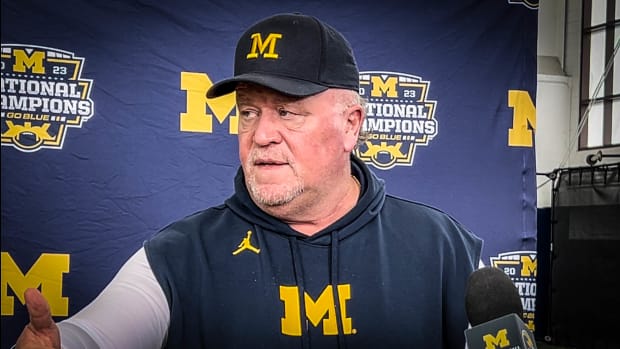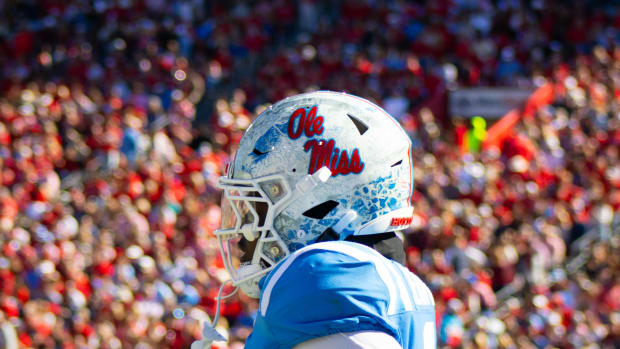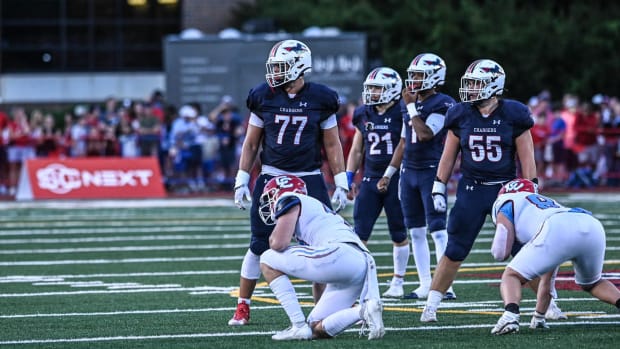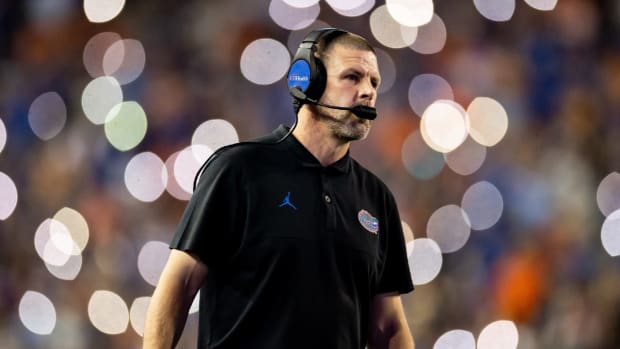College Football's Rapid Coaching Churn Creating Downstream Effects
The coaching carousel is undoubtedly spinning quicker than ever among head coaches, but you probably already know that with LSU and USC among the multiple vacancies on the market. But there are downstream effects being increasingly felt within the industry before the cycle even truly ramps up.
It may not seem like much, but 10 schools have fired assistant coaches by Week 11 this season. One more (Baylor) will replace Joey McGuire, who left for Texas Tech, and Ohio State reassigned defensive coordinator Kerry Coombs. Navy’s Ivin Jasper was initially fired by athletic director Chet Gladchuk before being re-hired.
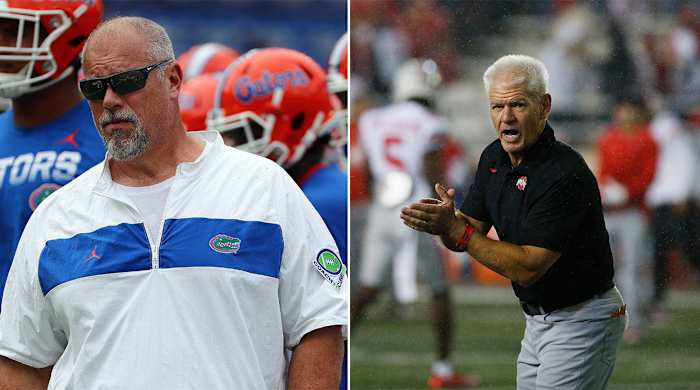
Florida's John Hevesy (left) was fired this week, while Ohio State's Kerry Coombs was demoted from DC in September.
Kim Klement/USA TODAY via Imagn Content Services, LLC (Hevesy); Joshua A. Bickel/Columbus Dispatch/USA TODAY NETWORK (Coombs)
Four Washington State assistants chose not to receive the COVID-19 vaccine and were subsequently fired after the state deadline to do so. Among them was Craig Stutzmann, whose brother Billy Ray also refused the vaccine at Navy and was fired for it after working in an off-field capacity through preseason camp.
Missouri, Auburn and Colorado got rid of assistant coaches before the end of October over on-field performance. UMass, Oregon State, Florida, Washington and Nebraska fired assistants by mid-November for on-field reasons as well, with many of those coaches being coordinators. Nebraska's was a whole house cleaning of the offensive side of the ball as part of Scott Frost’s contract restructuring. Florida’s Dan Mullen and Washington’s Jimmy Lake offered similar sacrifices to their fan bases in order to possibly preserve their jobs in the long run by getting rid of coordinators. Florida was the only school besides Washington State and Nebraska to fire multiple coaches (two).
What softens the blow of the assistant churn is the support staff ready to step up. College football coaching staffs can seem bloated when you look beyond the 10 assistants to the multiple quality control and analyst roles in the building, but it can come in handy to have a coach on the sidelines ready to go. When Scott Cochran had to initially step away from Georgia’s coaching staff for personal reasons in August, former Florida and South Carolina head coach Will Muschamp filled his spot. After firing defensive coordinator Todd Grantham this week, the Gators gave linebackers coach Christian Robinson play-calling duties for the remainder of the season, and off-field assistant Paul Pasqualoni (the former Syracuse and UConn head coach) joined the on-field coaching staff to assist Robinson in calling plays for the first time.
Having people able to step up to fill assistant voids also allows those coaches to recruit, which only on-field coaches can do. And recruiting is the part of the equation that is speeding things up on the head coach end. There has been a seemingly unprecedented amount of midseason head coaching turnover in 2021. As noted in an October story by Sports Illustrated's Ross Dellenger:
While midseason coaching dismissals have evolved into a more normal event some 17 years later, this year is challenging the annals of the sport in that category. Five FBS coaches have been fired before the calendar turns to November, the most firings over the first two months of the season in at least a decade—and maybe, experts say, ever.
While COVID-19 vaccine mandates likely won’t force many more firings, the pressure release valve of an embattled coach making an in-season coordinator change isn’t going away. Neither is the fact that, apparently, head coach firings are creeping earlier and earlier—as is filling those openings.
On Wednesday, UConn hired former UCLA coach Jim Mora to replace Randy Edsall, who stepped down in September. And while Georgia Southern hired Clay Helton, a recently fired head coach, Texas Tech hired McGuire off of a conference rival’s staff in early November, clearly with December's early signing day in mind. Perhaps this is an unintended consequence of the 2017 rule change that added an early signing period, but add midseason assistant churn to the list of things that are different about the 2021 coaching cycle. It may be here to stay.
More College Football Coverage:
• Who Are the Upset Masters of College Football?
• In Keeping Scott Frost, Nebraska Has Admitted Defeat
• Texas Tech Goes Back to High School With Joey McGuire Hire
• The Good, The Bad and The Ugly of the New CFP Rankings

